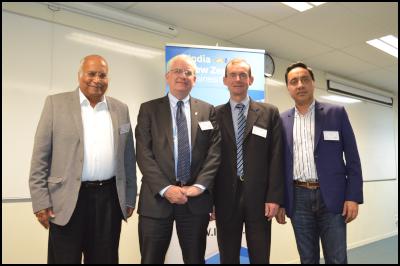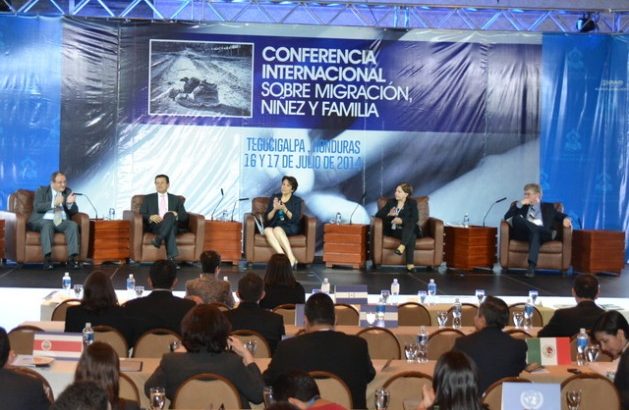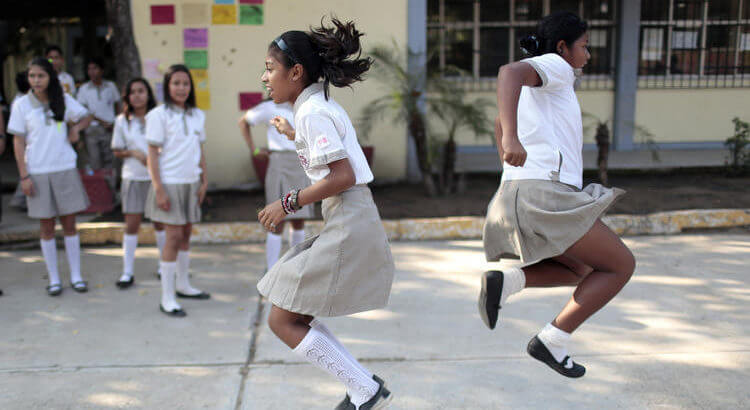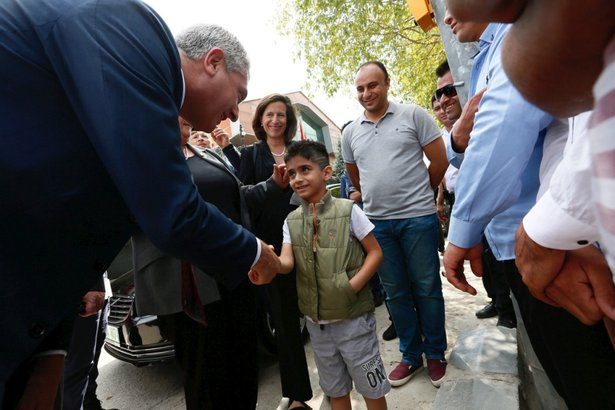Por: Thelma Mejía
La crisis migratoria desatada por los miles de niñas y niños de América Central detenidos en Estados Unidos, representa una pérdida masiva de generaciones que huyen de la pobreza, la violencia y la inseguridad en Honduras, Guatemala y El Salvador, los tres países más violentos del llamado Triángulo Norte del istmo.
Unos 200 especialistas y funcionarios de países y organismos involucrados se congregaron en Tegucigalpa para promover soluciones a la emergencia humanitaria, el miércoles 16 y este jueves 17, en una Conferencia Internacional sobre Migración, Niñez y Familia, convocada por el gobierno hondureño y el Fondo de las Naciones Unidas para la Infancia (Unicef).
La conferencia concluyó con un llamado a establecer vías para que los países involucrados implementen un programa con recursos suficientes para el control efectivo de fronteras y la eliminación de “puntos ciegos”, usados en la ruta del migrante.
También exhortaron a concretar rápidamente una iniciativa regional que permita abordar esta crisis humanitaria en forma conjunta y definitiva, en reconocimiento de una responsabilidad compartida para alcanzar la paz, la seguridad, el bienestar y la justicia de las poblaciones centroamericanas.
Pero la declaración Hoja de Ruta: Una Invitación a la Acción no pasó de generalidades y careció de compromisos específicos para afrontar una crisis de dimensiones inéditas.
El gobierno de Estados Unidos afirma que las patrullas fronterizas capturaron este año a unos 47.000 menores de edad, que permanecen retenidos en saturados albergues mientras se cumplen los trámites para su deportación.
José Miguel Insulza, secretario general de la Organización de Estados Americanos (OEA), dijo durante la conferencia que en el año 2011 los menores migrantes no acompañados de América Central que buscaban ingresar a Estados Unidos fueron 4.059 menores.
Pero esa cifra trepó a 21.537 en el 2013 y a 47.017 en lo que va del 2014.
“Esa gran cantidad de niños son de México, Guatemala, Honduras y El Salvador. Se ha identificado que 29 por ciento de esa cifra es de niños de Honduras, 23 por ciento de México, y 24 por ciento de Guatemala y El Salvador”, resumió Insulza, antes de hacer un llamado a no criminalizar la ola migratoria.
Las imágenes de cientos de menores, subiendo solos o acompañados con familiares o extraños en los vagones del tren mexicano conocido como “La Bestia”, con destino a la frontera con Estados Unidos, despertó finalmente la preocupación de los gobiernos del área por la situación.
En ello influyó el anuncio de la administración de Estados Unidos de que comenzaría a realizar deportaciones masivas de las niñas y niños interceptados en los últimos meses, lo que comenzó a hacerse realidad con los menores hondureños el lunes 14.
La reunión de Tegucigalpa congregó a funcionarios y expertos de países receptores y expulsores de los migrantes. Durante sus debates, los participantes analizaron que en el caso de Guatemala, la migración está dominada por la situación de pobreza, mientras que en El Salvador y Honduras, la gente huye más aún de la inseguridad ciudadana y la violencia criminal.
El presidente hondureño, Juan Orlando Hernández, los llamó incluso “desplazados de guerra” y consideró que se está ante una emergencia “que hoy ha explotado entre nosotros”.
De nueve menores migrantes no acompañados que cruzan la frontera de Estados Unidos, siete son hondureños que proceden de localidades denominadas como “territorios calientes” de la inseguridad y violencia, dijo el mandatario.
Ricardo Puerta, un experto en temas migratorios, dijo a IPS que la región centroamericana está perdiendo a sus generaciones, “esto está golpeando duro, en especial en países como Honduras donde la gente huye de la violencia y la edad de quienes emigran oscila entre los 12 y 30 años”.
“Estamos perdiendo muchos nuevos y buenos brazos y cerebros que por regla general no regresan, si lo hacen es como turistas nacionales, pero no en forma permanente”, acotó.
Laura García realiza servicios de limpieza. Cobra un promedio de 12 dólares por casa u oficina que limpia, pero apenas sobrevivel. Ella quiere emigrar, sin importar los riesgos ni lo que oye sobre el endurecimiento de las políticas migratorias de Estados Unidos, cuyos funcionarios repiten sin cesar que los migrantes centroamericanos no son “bienvenidos”.
“Escucho todo eso, pero aquí no hay trabajo. Hay días en que limpio dos casas, otro solo una y a veces ninguna. Y como soy una mujer mayor, que pasa los 35 (años), nadie quiere darme empleo. Lucho y lucho, pero quiero probar allá en el Norte, dicen que pagan mejor por cuidar gente”, explicó a IPS con voz entrecortada.
Además, vive en la conflictiva y pobre colonia (barrio) San Cristóbal, en el norte de Tegucigalpa, que las pandillas controlan y donde a partir de las 6:00 de la tarde imponen su propia ley: nadie sale y nadie entra sin autorizarlo los delincuentes.
“Dicen que en el camino (ruta migratoria) pasan muchas cosas, que asaltan, que secuestran, que violan, dicen muchas cosas, pero tal como está aquí la situación, da igual morir en el camino que aquí, acechada por las maras (pandillas), a la espera que un día te peguen un tiro”, acotó.
En una intervención ante la Conferencia Episcopal de Estados Unidos, el 7 de julio, el cardenal hondureño, Óscar Andrés Rodríguez Maradiaga, advirtió en Washington sobre la desesperanza que se vive en Honduras y el resto de América Central.
“Es como si alguien ha desgarrado una arteria en Honduras y otros países centroamericanos. El miedo, la pobreza agobiante y sin futuro, significa que estamos perdiendo nuestra alma, nuestros jóvenes. Si esto continúa sucediendo, los corazones de nuestra región dejarán de latir”, aseguró el cardenal, en una intervención que aún no fue difundida en Honduras.
El prelado católico fustigó las deportaciones masivas de menores hondureños que comenzaron a llegar procedentes de México y Estados Unidos. “¿Se imagina si usted comienza su vida adulta siendo tratado como un criminal? ¿A dónde ir desde allí?”, inquirió.
La Iglesia Católica hondureña ha insistido en que el miedo y la pobreza agobiante, junto al desempleo y la violencia, inducen a los padres a la desesperada medida de encaminar a sus hijos al peligroso camino de la migración para salvarles la vida, al tiempo que demanda políticas públicas incluyentes que eviten esta fuga generacional.
Guatemala, Honduras y El Salvador son considerados países en donde la violencia creció, impulsada por el desplazamiento de los carteles de México y Colombia del tráfico de drogas, debido a la guerra antidrogas que libran los gobiernos de esos países.
En 2013, en El Salvador la tasa de homicidios fue de 69,2 cada 100.000 habitantes, en Guatemala de 30 y en Honduras de 79,7, según datos oficiales.
Actualmente, se estima que más de un millón de hondureños residen en Estados Unidos, de una población total de 8,4 millones de personas. En el 2013, esos migrantes aportaron remesas al país por 3.100 millones de dólares, según datos de la Asociación Hondureña de Instituciones Bancarias.
Fuente: http://www.ipsnoticias.net/2014/07/migrantes-infantiles-son-una-arteria-abierta-en-america-central/














 Users Today : 95
Users Today : 95 Total Users : 35460112
Total Users : 35460112 Views Today : 117
Views Today : 117 Total views : 3418748
Total views : 3418748